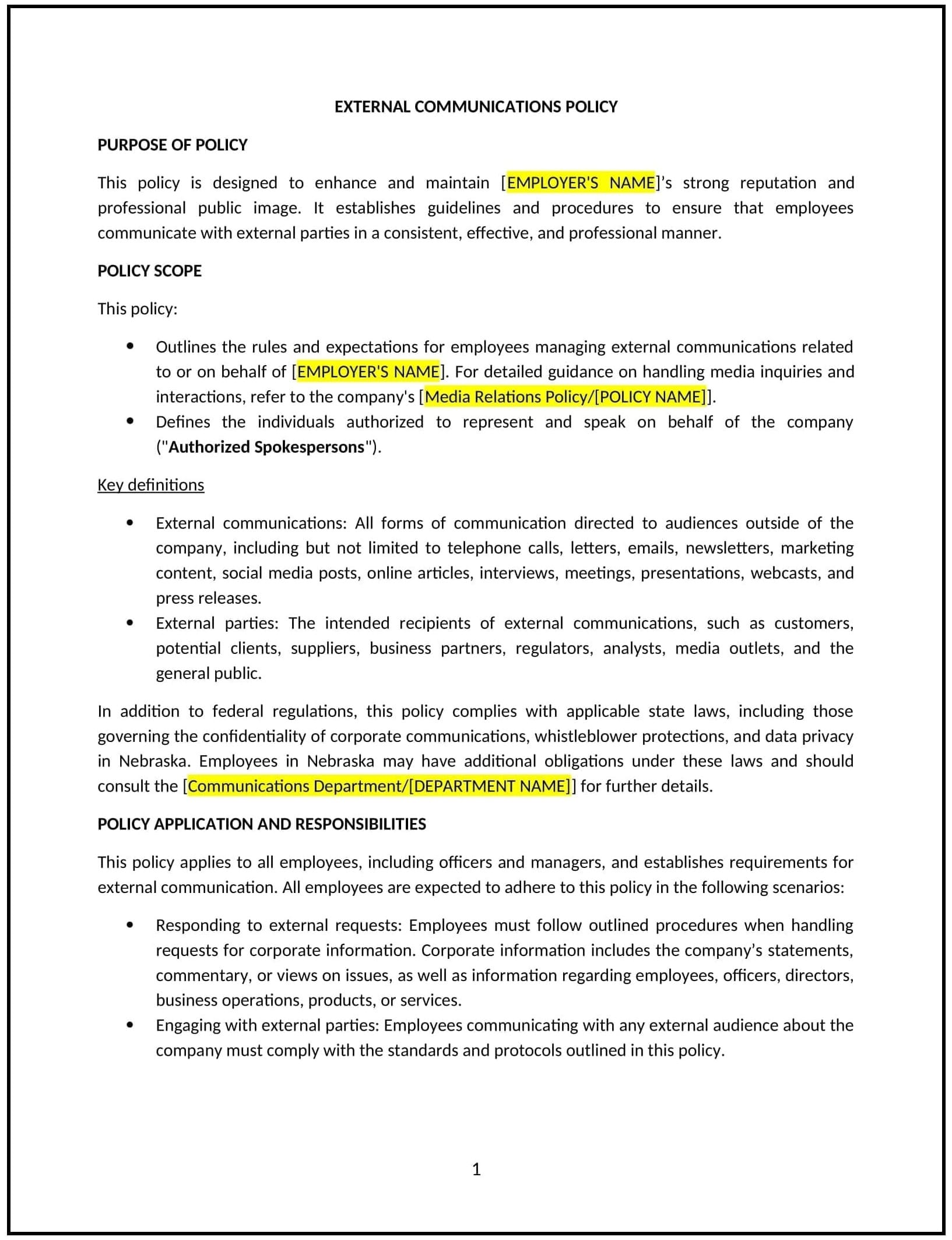External communications policy (Nebraska): Free template
Got contracts to review? While you're here for policies, let Cobrief make contract review effortless—start your free review now.

Customize this template for free
External communications policy (Nebraska)
An external communications policy helps Nebraska businesses establish clear guidelines for how employees should engage with the public, media, and other external parties on behalf of the company. This policy outlines the rules for responding to inquiries, providing information, and maintaining a consistent and professional image for the business. It is designed to ensure that all external communications align with the company’s values, protect confidential information, and avoid potential misunderstandings or legal issues.
By adopting this policy, businesses in Nebraska can control the messaging about their brand, maintain a strong and consistent public presence, and ensure that employees understand the proper channels for external communication.
How to use this external communications policy (Nebraska)
- Define the scope of external communications: Clearly explain what constitutes external communications, including interactions with the media, customers, investors, vendors, and the public. Specify the different types of communications, such as press releases, social media posts, public statements, or responses to inquiries.
- Assign communication responsibilities: Identify the individuals or teams responsible for handling external communications, such as the marketing or PR team, senior leadership, or designated spokespeople. Ensure that only authorized employees communicate on behalf of the business.
- Set guidelines for content: Outline the key principles for all external communications, such as ensuring accuracy, professionalism, consistency, and alignment with the company’s values and objectives. Provide guidance on tone, language, and messaging.
- Establish channels for communication: Specify the official channels through which employees should direct external communications, such as the company website, social media accounts, or customer service lines. Encourage employees to direct inquiries to the appropriate department rather than responding personally.
- Address social media use: Provide specific guidelines for employees on how they can use social media platforms, both personally and professionally, to ensure that their posts do not negatively affect the company’s reputation. Emphasize the importance of separating personal and professional online activities.
- Protect confidential information: Emphasize that employees must not share confidential or proprietary information in external communications. Define what constitutes confidential information and outline the consequences of violating this rule.
- Include crisis communication procedures: Outline how the business will respond to crises or emergencies, such as negative publicity, product recalls, or legal issues. Designate a crisis communication team and provide guidance on how to handle sensitive or urgent communications during a crisis.
- Review and update: Periodically review and update the policy to ensure that it remains relevant, aligns with current communication tools, and reflects any changes in Nebraska laws or business needs.
Benefits of using this external communications policy (Nebraska)
This policy provides several benefits for Nebraska businesses:
- Maintains brand consistency: By establishing clear guidelines for external communications, businesses can ensure that their messaging is consistent and reflects their core values across all platforms and interactions.
- Protects the business’s reputation: Properly managed external communications can help prevent misunderstandings, misinformation, or negative publicity, safeguarding the company’s image and credibility.
- Reduces legal risks: By providing clear rules for what can and cannot be communicated externally, businesses can reduce the risk of inadvertently sharing confidential information or making legally problematic statements.
- Improves communication efficiency: A well-structured policy streamlines communication by designating specific individuals or departments to handle external messages, which helps avoid confusion and ensures timely responses.
- Encourages employee accountability: Employees will have a clear understanding of their role in managing external communications, reducing the chances of accidental or unauthorized disclosures.
Tips for using this external communications policy (Nebraska)
- Communicate the policy clearly: Ensure that all employees are aware of the policy and understand their role in managing external communications. Provide training or orientation on best practices for external messaging.
- Be consistent: Ensure that all external communications align with the company’s overall messaging strategy and tone, and are consistent with the brand’s image and values.
- Use a centralized system: Maintain a central point of contact or team responsible for reviewing and managing external communications to prevent conflicting messages and to ensure a cohesive public presence.
- Monitor social media: Regularly monitor social media platforms for mentions of the business, and set up alerts to address any issues or negative comments in a timely and professional manner.
- Have a crisis communication plan in place: Prepare for potential crises by developing a crisis communication plan that can be activated in the event of a public relations emergency or other urgent situations.
- Review and update regularly: Regularly assess the effectiveness of the policy and make adjustments as needed to keep up with changes in communication channels, technology, or public perception.